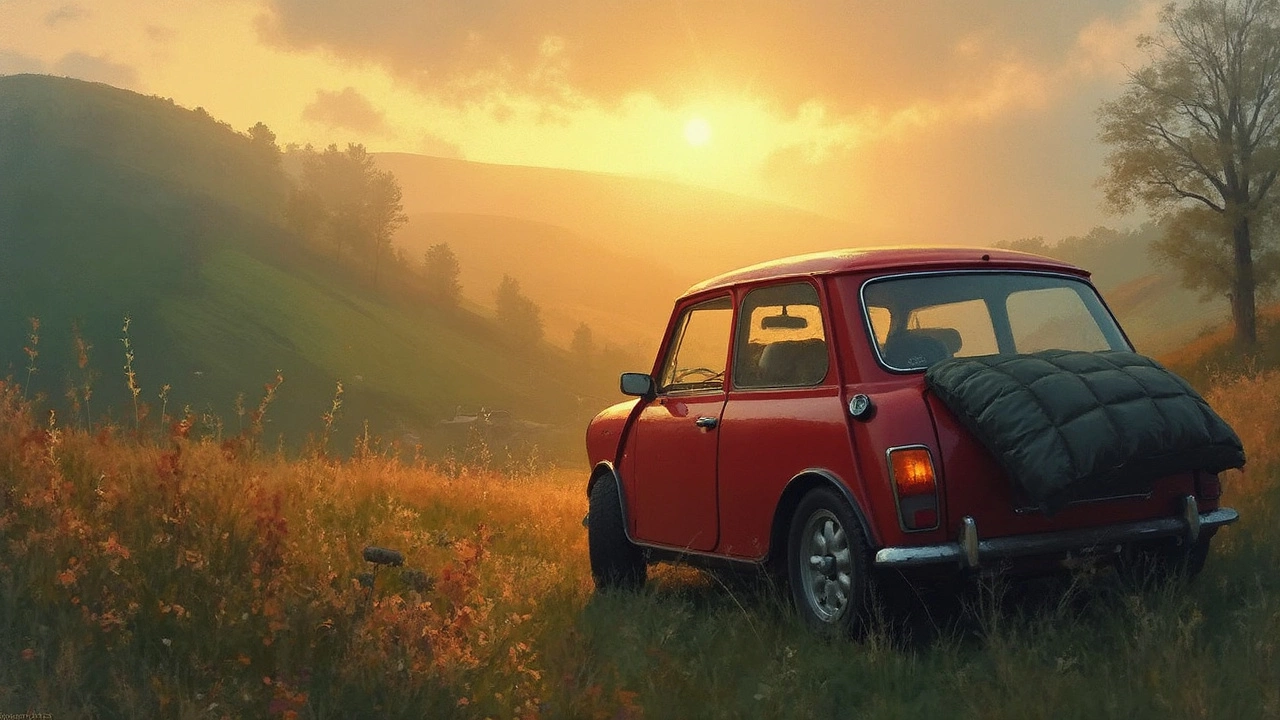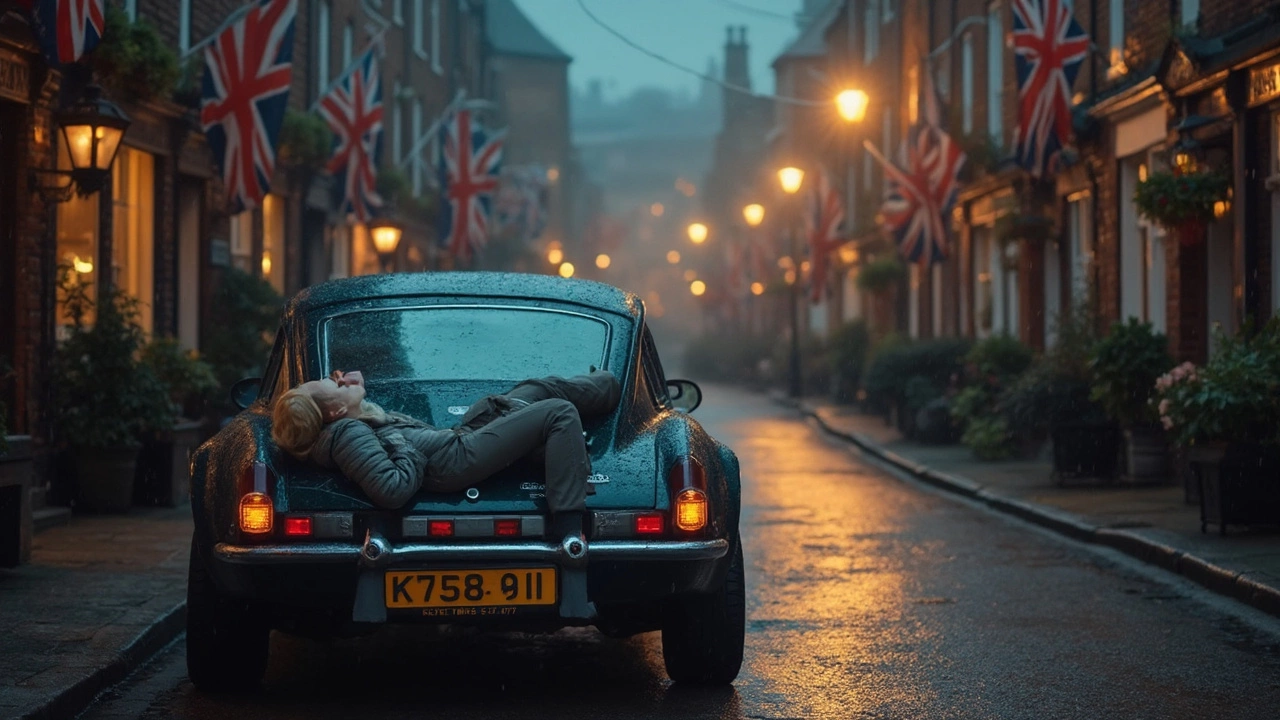Is It Legal to Sleep in Your Car in the UK: Camping Rules You Need to Know
 Mar, 23 2025
Mar, 23 2025
So, you're thinking of sleeping in your car in the UK? Sounds like an adventure, right? Before you recline that seat, let's chat about what's legal and what's not.
The UK is a collection of contrasting landscapes and local laws. While it might seem perfectly harmless to park overnight and drift into dreamland, reality can sometimes be a little less straightforward. Some places have strict laws that might get you fined, while others are more laid-back about the whole car camping thing.
Let's start with the local councils. They wield a lot of power when it comes to parking rules. Every borough can have its own set of guidelines. Some areas are off-limits entirely, thanks to local restrictions, while others might require you to show some kind of permit. Never assume it's okay just because it's a quiet street.
Oh, and those inviting countryside spots? They're lovely, but it's good to know that a lot of land is privately owned in the UK. Trespassing is a no-no. So, if you're eyeing up a secluded spot with a nice view, you might want to double-check the ownership first.
- Understanding Legal Basics
- Parking Restrictions
- Wild Camping Insights
- Health and Safety Tips
- Dealing with Authorities
Understanding Legal Basics
When it comes to catching some shut-eye in your car across the UK, the legality can be a bit of a mixed bag. It all boils down to UK car sleeping and understanding the various rules in place.
Know Where You Are
The first thing you need to keep in mind is that the UK is broken down into different countries and local councils, each with their own rules. England, Scotland, Wales, and Northern Ireland might have slightly different takes on the issue. Not to mention, every council might enforce their own local regulations.
In most cases, car sleeping itself isn't illegal, but where you choose to park makes all the difference. Many places allow sleeping in your car in designated rest areas or service stations, but doing the same on public streets or in a residential neighborhood can land you a hefty fine.
Private vs Public Land
So, what's the deal with private and public land? Public land, like service areas, often allows overnight stays. Private land, on the other hand, is a bit trickier. If you’re on someone's private property, you need the owner's permission or else it's considered trespassing.
On private land, violating UK camping rules could result in being asked to leave or worse. In regions like Scotland, where wild camping UK is sometimes permitted, it’s crucial to make sure you're not on private land without consent.
Specific Regulations
Some councils have introduced Public Space Protection Orders (PSPOs) making it illegal to sleep in a vehicle overnight in certain areas. If you’re planning a spontaneous nap, always check if there’s a PSPO in force.
- Check local council websites for details.
- Consult online forums or local communities familiar with the area.
- Keep an eye out for signage that could indicate restrictions.
Knowing the car camping laws not only saves you from potential fines but ensures you have a stress-free rest. Stay informed, and enjoy the unique experience of exploring the UK’s beautiful scenery from the comfort of your car!
Parking Restrictions
So, you've decided that parking your car for a snooze is a good idea in the UK. But, watch out! The rules on where you can park your car and sleep are pretty varied and sometimes confusing. It's not just about finding a spot that's convenient. Local laws are the big dogs in this game, and ignoring them might turn your cozy car bed into a fine-paying nightmare.
Local Council Regulations
Each council in the UK can have its own set of parking regulations. It's a bit like a patchwork quilt; one area might welcome you with open arms (or, at least, not bother you), while another area might slap you with a penalty notice before you've even unpacked your toothbrush. The best thing to do? Check the local council's website in the area you plan to park. They usually spell out what's allowed and what isn't pretty clearly.
Posting and Signage
Signs are your best friends (or warning signals!) when it comes to car snoozing. Most car parks will have signs displaying whether or not overnight parking is permitted. Make sure you read signs carefully. Some say 'No Overnight Parking,' which means you should reconsider that spot. If it's not posted, it's not safe to assume you're in the clear. Ignorance won't get you off the hook with fines.
Private Property and Commercial Car Parks
Parking on private property without permission is a definite no-go. Many commercial car parks and private landowners have restrictions in place for a reason. You could get clamped or towed, and that's a quick way to ruin a road trip. Some places do allow overnight parking, sometimes for a fee. Services like Park4night and JustPark are great for finding legal spots and might save you a headache.
National Trusts and Other Scenic Areas
Car camping in British beauty spots can be tempting. However, organizations like the National Trust often have clear rules, especially in designated scenic spots. As enchanting as it sounds, sleeping among the rolling hills or next to a serene lake might not be allowed. Check ahead if you plan to visit these areas, as they can have specific rules or might require permission.
Use of a Car Park Table
| Area Type | Overnight Parking |
|---|---|
| City Center | Usually not allowed, check local signage |
| Suburban Areas | Check local council regulations |
| Rural Countryside | Possible in some areas but check for private property |
| Tourist Attractions | Often restricted, check with management |
In short, know the laws before you park anywhere for the night. It's not just about finding a good spot but about ensuring that spot is legal. No one wants a midnight wake-up call from a tow truck!

Wild Camping Insights
Alright, let's chat a bit about wild camping in the UK. Sounds pretty cool, doesn't it? Camping in the great outdoors beneath a blanket of stars. Now, who wouldn't want to experience that?
In theory, wild camping sounds fantastic, but when it comes to legality, things get a bit murky. Legally speaking, wild camping in England and Wales without the landowner's permission is a no-go. Turns out a lot of the land is privately owned, so setting up camp without okaying it first could land you in hot water. Scotland, however, is a different story. Thanks to the Land Reform (Scotland) Act 2003, you can pretty much camp anywhere you like—just as long as you follow the Scottish Outdoor Access Code.
The Dos and Don'ts
So, what can you do if you want to experience wild camping legally? Here’s a quick rundown:
- Get Permission: If you're itching to set up in England or Wales, make sure you get in touch with the landowner. A simple request can go a long way!
- Leave No Trace: This is a biggie. Whatever you bring, take it back with you. Sounds obvious, but you'd be surprised.
- Avoid Private Property: Unless you have permission, steer clear of privately owned land. It’s tempting, but just don’t.
- Respect the Locals: Nobody likes a noisy neighbor, right? Keep it down, respect their space, and everyone’s happy.
Scotland's Comfort
Scotland's a bit more chill when it comes to wild camping. Under the Land Reform (Scotland) Act, you've got what’s called the right to roam. This means you can camp on most unenclosed land. It's awesome, but there are guidelines. Ensure you camp away from roads, keep groups small, and spend no more than a couple of nights in one spot.
Quick Stats
Ever wondered how popular wild camping is in the UK? Here’s an interesting stat: a survey conducted in 2022 found that 40% of UK campers preferred wild camping for its solitude and connection to nature.
So, there you have it. Keep an eye on those rules, respect the land, and wild camping can be one heck of an adventure!
Health and Safety Tips
Even if sleeping in your car feels like a carefree move, putting some thought into health and safety ensures it stays hassle-free. Let's break it down.
Keep It Ventilated
When you're catching Z's in your car, it's essential to maintain airflow. Cracking open a window can combat stuffiness, but don't forget the British weather likes to keep you guessing!
Parking Smart
It's not just about legality. You’ll want to choose a safe, well-lit area. Avoid remote or unfamiliar spots which might seem dodgy at night. Safety is key, and you wouldn't want any unpleasant surprises.
Mind the Temperature
Car temperatures can drop at night or get too hot during the day. Pack layers or a sleeping bag if you're attempting this in colder months. In summer, look out for shaded parking areas to avoid morning heat.
Stay Charged and Connected
Running out of battery is a no-go. Keep a charger handy, not just for convenience but for safety too. It's good to have your phone ready to make a call, in case you need directions or assistance.
Privacy Matters
Consider getting window covers or tints. They aid in privacy and help in controlling the inside temperature. Plus, who wants strangers peeking in while you're snuggled up?
Food and Water
Bring enough snacks and water to last the night. Being hangry is never fun, and staying hydrated is essential, especially after a long day out and about.
Emergency Kit
Prepare for the unexpected with a basic emergency kit. The UK is generally safe, but having things like a first-aid kit, flashlight, and some tools can come in handy. Here's a quick rundown:
- First-aid supplies—bandages, antiseptic wipes, pain relief
- Swiss army knife or multi-tool
- Flashlight and spare batteries
- Non-perishable snacks
Following these health and safety tips doesn’t just mean you'll sleep well, but you'll do so with peace of mind. Have that adventure, but don’t forget to be wise about it!

Dealing with Authorities
So, you find yourself parked and curled up in your sleeping bag when there's a tap on the window. Yep, it’s the authorities, and it's time to talk. How do you handle this? Let's break it down.
Stay Calm and Friendly
Your first move is to stay relaxed. You're not in trouble yet. Be friendly and polite, and you'll usually get a gentler response. Explain what you’re doing and why you're there. Most of the time, officers are more about enforcing UK camping rules than spoiling your night.
Know Your Rights
It's good to remember a few basics. If you’re parked on a public road where there are no restrictions, you may have some right to be there. However, parking restrictions can vary a lot. On private property? You're likely trespassing unless you have explicit permission to be there.
Follow Instructions
Listen to what the officer says. If they ask you to move on, it's usually best to comply. You might be directed to a more appropriate location, like a nearby campsite or designated overnight parking area. They’re often just making sure everyone’s safe and complying with local car camping laws.
Takeaways
- Always stay calm and polite—it can go a long way.
- Know whether you're on public or private land.
- Understand local parking restrictions before you park overnight.
By following these tips, you can make your night sleeping in your car smoother and avoid hassle with local authorities.